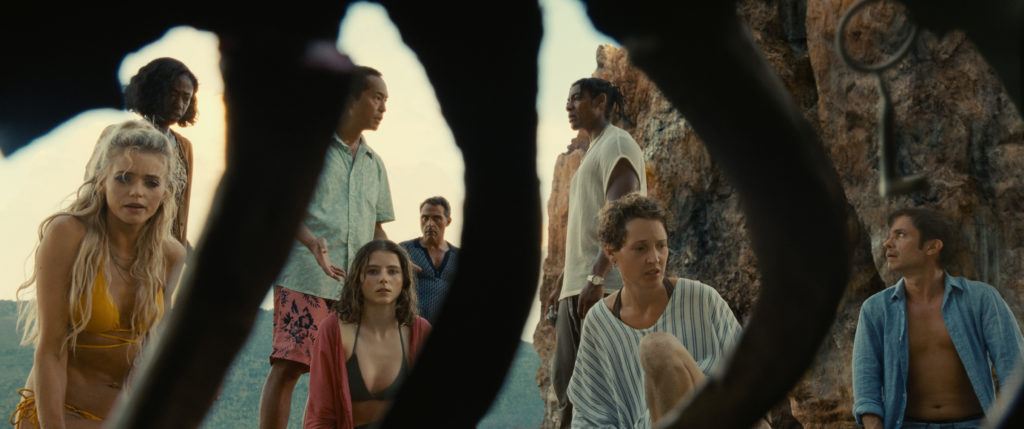Old

(from left) Chrystal (Abbey Lee), Patricia (Nikki Amuka-Bird), Jarin (Ken Leung), Maddox (Thomasin McKenzie), Charles (Rufus Sewell), Mid-Sized Sedan (Aaron Pierre), Prisca (Vicky Krieps) and Guy (Gael García Bernal) in Old, written for the screen and directed by M. Night Shyamalan.
We already know the premise from the theatrical trailer—a family vacations on an island where people age rapidly. Naturally, bad things happen. It’s as if someone found the opposite of Acciaroli, a real Italian village where residents have an unusually long lifespan because of a common genetic mutation.
The idea could take the film in all kinds of fascinating directions. Instead, it aims as low as the FINAL DESTINATION series, teasing us with the possibility of horrors, only to tease us some more with the banality of horrors. Every so often, writer/director M. Night Shyamalan throws in a split diopter or dutch angle to remind us that he is an artist not a carnival barker.
In OLD, Shyamalan can’t resist his perennial urge to bombard us with clunky exposition. The aforementioned family sings songs in the van on the way to beach resort.
The mother, Prisca (Vicky Krieps), says to her daughter, “You have such a beautiful voice. I can’t wait to hear it when you’re older.”
How much do you want to bet she’s going to sing again, just before the end?
Granted, that’s not the point. Having adapted this story from the French graphic novel, Sandcastle, by Pierre Oscar Levy and Frederik Peters, Shyamalan trades in his whiplash twists for an underwhelming reveal. My growing frustration, however, lies with the director’s penchant for underestimating his audience.
OLD sets up an interesting, if rather exhausted premise, that the resort is a sort of science experiment. Shyamalan’s too self-serious to see the inherent hilarity of what can go wrong with such experiments—think CABIN IN THE WOODS. And where there are scientists, there are questions. If dead tissue doesn’t age, why do corpses rot? If they age at different rates, is it because time moves differently in one part of the island versus another? People experience dementia, grow up, birth children, and yet the pasta is still edible? The movie calls specific attention to accelerated nutritional deficiency. How do they not run out food in twenty minutes? How do the kids not notice each other changing from minute to minute? Is the island bound by the same physics that silence helicopters just out of frame?
At 108 fleeting minutes, the story doesn’t take the time to embed us in the self-discovery of the characters, or explore the disconnect between aging and experience which is more than simply getting decrepit. By the end, adult Trent (Emon Elliott) and Maddox (Embeth Davidtz) are taller, older, greyer, and inexplicably wiser, despite lacking a life’s worth of joys and sorrows. They remain six plus a day. The closest the story reaches toward poignancy involves an ordinarily meaningful event that turns traumatic because it’s thrust upon people cognitively still six years old. Nobody seems much affected by anything. But the plot must move forward.
Some of you will remember BICENTENNIAL MAN, Chris Columbus’ 1999 adaptation of an Isaac Asimov novella about Andrew, an android who lives through two centuries and yearns to become human. While excessively saccharine, deeply flawed, and mostly unchallenging, I admired the way the film spans time through Andrew’s eyes rather than ours. In a relatively short running time, we feel as though we’ve taken a long journey with Andrew. In OLD, we feel as though we’re watching a rerun of LOST that sets up all kinds of interesting threads and fails to tug on any of them.
M. Night woefully underuses a peripheral character, a rapper going by the nom de guerre Midsize Sedan (Aaron Pierre, THE UNDERGROUND RAILROAD). In GLASS, the third and most disappointing installment of the UNBREAKABLE trilogy, Shyamalan petulantly wags his finger at the comic book genre. Here, he plops the famous rapper into the story to make a statement, when the mere existence of Black men is sufficient to unmask others prejudices. If Shyamalan truly wanted to be subversive to the genre, he’d have cast Pierre as the last man standing through whose eyes the entire story is told.